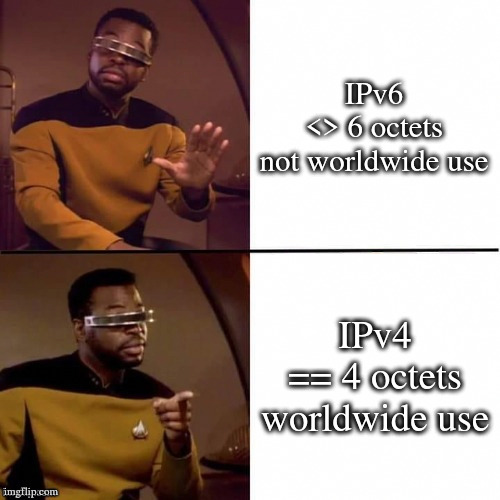this post was submitted on 19 Jun 2024
313 points (85.6% liked)
Programmer Humor
19623 readers
96 users here now
Welcome to Programmer Humor!
This is a place where you can post jokes, memes, humor, etc. related to programming!
For sharing awful code theres also Programming Horror.
Rules
- Keep content in english
- No advertisements
- Posts must be related to programming or programmer topics
founded 1 year ago
MODERATORS
you are viewing a single comment's thread
view the rest of the comments
view the rest of the comments

Yes, but why would you want to? We have enough addresses for the foreseeable future.
1:1 stateless NAT is useful for static IPs. Since all your addresses are otherwise global, if you need to switch providers or give up your /64, then you'll need to re-address your static addresses. Instead, you can give your machines static private IPs, and just translate the prefix when going through NAT. It's a lot less horrible than IPv4 NAT since there's no connection tracking needed.
This is something I probably should have done setting up my home Kubernetes cluster. My current IPv6 prefix is from Hurricane Electric, and if my ISP ever gives me a real IPv6 prefix, I will have to delete the entire cluster and recreate it with the new prefix.
It should only be needed if your ISP is brain-dead and only gives you a /64 instead of what they should be doing and also giving you a /56 or /48 with prefix delegation (I.e it should be getting both a 64 for the wan interface, and a delegation for routing)
You router should be using that prefix and sticking just a /64 on the lan interface which it advertises appropriately (and you can route the others as you please)
Internal ipv6 should be using site-local ipv6, and if they have internet access they would have both addresses.
And if you want static ips either use dhcp6 or disable the randomisation of eui64 addresses
I have static IPs for my Kubernetes nodes, and I actually use DHCPv6 for dynamic dns so I can reach any device with a hostname, even though most of my devices don't have static IPs.
The issue is those static IPs are tied to my current ISP, preventing me from changing ISPs without deleting my entire Kubernetes cluster.
It certainly looks like you can give it a prefix to assign out, possibly even multiples